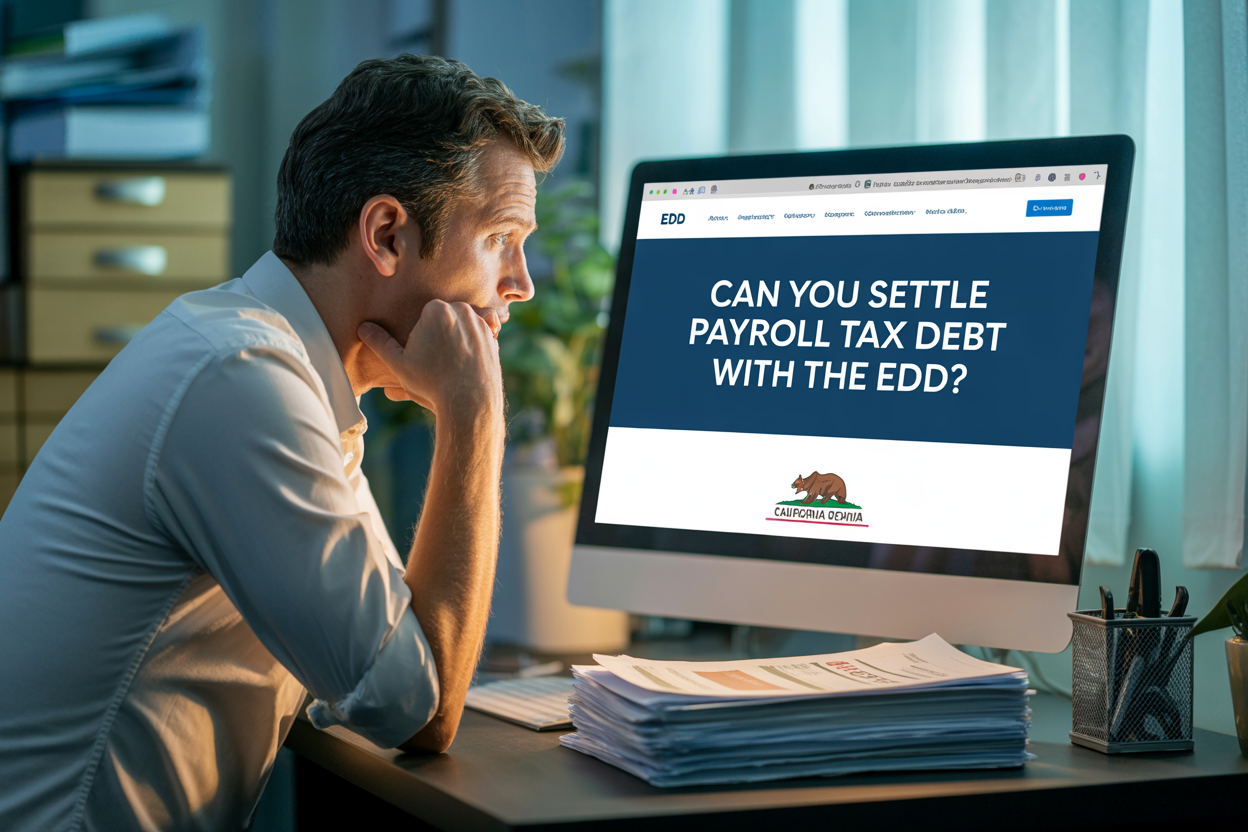Can You Settle Payroll Tax Debt with the EDD?

If you owe payroll taxes to the California Employment Development Department (EDD), you’re not alone. Many business owners fall behind on filing DE-9s, paying unemployment insurance (UI), or keeping up with California withholding tax requirements.
But here’s the reality:
EDD payroll tax debt is serious — and settling it isn’t easy.
The EDD has powerful enforcement tools, and they’re not shy about using them:
- Bank levies
- Wage garnishments
- Tax liens
- Even
criminal charges in extreme cases
The good news? You may have options to reduce, negotiate, or settle EDD tax debt — but it depends on your situation.
This guide covers:
- Whether the EDD offers Offers in Compromise
- What qualifies for settlement
- Alternatives like installment agreements
- How to stop levies and protect your business
Does the EDD Offer Settlements Like the IRS?
Yes — the EDD does have an Offer in Compromise (OIC) program, but it’s limited.
Here’s what you need to know:
| Feature | IRS OIC | EDD OIC |
|---|---|---|
| Available to businesses? | Yes | No |
| Available to individuals? | Yes | Yes |
| Settles payroll tax debt? | Yes | Only if business is closed |
If your business is still operating, you CANNOT settle EDD payroll tax debt through OIC.
Only individuals — former business owners, officers, or responsible persons — may qualify for settlement after business operations have ceased.
When EDD Debt Turns Personal
The EDD can personally assess payroll tax debt against:
- Business owners
- Officers
- LLC managing members
- Anyone who controlled payroll funds
If this happens, and the business is closed, you may be eligible to settle your share of the debt personally — but not the entire business liability.
EDD Offer in Compromise – Eligibility Checklist
To qualify for an EDD Offer in Compromise:
- The business must be defunct (no longer operating)
- You must be personally assessed by the EDD
- You must be unable to pay the full amount now or in the future
- You must provide
full financial disclosure
EDD uses a detailed personal financial statement and will evaluate:
- Income and expenses
- Assets (real estate, vehicles, retirement accounts)
- Ability to pay in the future
They may also request tax returns, bank statements, and paystubs.
Tip: A properly prepared OIC must prove your inability to pay — not just financial stress.
What If You Don’t Qualify for a Settlement?
If you don’t meet EDD’s strict OIC criteria, other options include:
1. Installment Agreement (Payment Plan)
EDD allows monthly payment arrangements, typically over 12–24 months. Interest will continue to accrue, and liens may remain active.
2. Hardship Status (Temporary Delay of Collection)
Rare, but possible if your financials show extreme hardship. Collections may be paused temporarily.
3. Challenge the Assessment
If you believe the tax bill is incorrect, you may still have time to protest or appeal — especially if the EDD is relying on estimates.
What Not to Do
- Ignore the notices: EDD moves fast — faster than the IRS.
- Assume you can settle like an IRS case: The rules are stricter.
- Let penalties and interest snowball: These can double the debt quickly.
- Transfer assets to avoid collection: This may trigger fraud investigations.
How a California CPA Can Help
If you’re facing EDD collections, working with a local tax professional can:
- Analyze your eligibility for settlement or other relief
- Build a case for OIC, hardship, or reasonable payment terms
- Stop wage garnishments and levies fast
- Represent you in appeals or compliance meetings
At Boulanger CPA, we defend California business owners from aggressive EDD actions — and help you resolve payroll tax debt the smart, legal way.
📞 Call 657-218-5700 or Schedule a Consultation
Frequently Asked Questions
Can I settle payroll tax debt if my business is still operating?
No. The EDD Offer in Compromise is only available for individuals — not active businesses.
What if the EDD has assessed me personally?
You may qualify to settle your personal liability through the EDD’s OIC program, especially if the business is closed.
Can I make payments on EDD tax debt?
Yes. The EDD offers payment plans and installment agreements based on your ability to pay.
How do I stop a bank levy from the EDD?
You must either pay the debt, negotiate a resolution, or request immediate relief — preferably with professional help.
Does the EDD remove penalties?
Yes, in some cases. You may request penalty relief if you show reasonable cause or administrative error.
📣 About the Author
Marc Boulanger, CPA is the founder of Boulanger CPA and Consulting PC, a boutique tax resolution firm based in Orange County, California and trusted by high-income individuals and business owners across Southern California.
He is the author of Defend What’s Yours: A California Taxpayer’s Guide to Beating the IRS and FTB at Their Own Game, available now on Amazon. The book offers a step-by-step plan for resolving IRS and FTB tax debt without losing your business, your home, or your peace of mind.
With over a decade of experience resolving high-stakes IRS and State tax matters, Marc brings strategic insight to complex cases involving wage garnishments, bank levies, unfiled returns, and six-figure tax debts. He is known for helping clients reduce or eliminate tax liabilities through expertly negotiated settlements and compliance plans.
Marc is a Certified Public Accountant licensed in California and Oklahoma and holds the designation of Certified Tax Representation Consultant. He is a member of the American Society of Tax Problem Solvers (ASTPS) — the national organization founded by the educators and practitioners who have trained thousands of CPAs, EAs, and tax attorneys in IRS representation strategy.
Every case is handled with discretion, proven methodology, and direct CPA-led representation — not call center scripts.
📍 Learn more at www.orangecounty.cpa or call (657) 218-5700.










